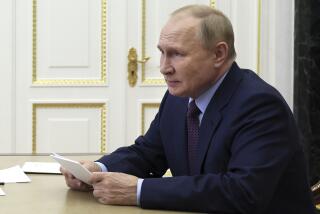Soviet Spying Increasing, Webster Says
Soviet espionage activity around the world has increased since Soviet President Mikhail S. Gorbachev launched glasnost, CIA Director William H. Webster said Thursday.
“If I had to characterize it, it is increasingly intensive,” Webster said. “(But) I think there’s an increasing effort not to be confrontational about it.”
Webster made his comments at a news conference in Los Angeles after a speech to the Town Hall of California on the proliferation of chemical and biological weapons in the Middle East.
Referring specifically to the activities of the Soviet KGB in the last two years, Webster said it is “understandable” that the Soviets would increase intelligence collection while in the process of reducing military arsenals.
“In these circumstances, it becomes increasingly important for them to get the advanced technology they need,” he said. “When you reduce the military, you increase intelligence.”
Both during his Town Hall appearance and afterward, Webster suggested that the thaw in U.S.-Soviet relations might enable the two nations to consider sharing intelligence information on subjects of mutual concern.
“Terrorism is a common interest,” he said. “Regardless of the Soviets’ past involvement with terrorism, I believe they are, under Gorbachev, at a point where they stand (against it). There is some possibility for the sharing of information of a political nature.”
Elaborating on that prospect at his news conference, the director made it clear that his thinking about some limited form of U.S.-Soviet cooperation against terrorism is in a preliminary stage.
“I’m ahead of myself on this one,” he said, noting that there could be serious objections by some U.S. allies and that any cooperation might best be explored through political talks rather than intelligence channels.
In his speech, Webster called it “ironic” that while the United States and Soviet Union have agreed to some missile reductions, many Third World nations are “building up” their arsenals.
While only the United States, the Soviet Union, China, Britain and France have declared nuclear arsenals, Webster said “several” other countries either possess nuclear devices or have the technology to assemble one “in a few weeks.” Others are developing such technology, he said.
“There are a number of serious dangers inherent in nuclear proliferation,” he said. “First is the obvious danger that nuclear weapons might be used in regional conflicts. . . . The sheer quantity and distribution of nuclear weapons and nuclear material across the globe could increase the risk of theft, sabotage and terrorism.”
More difficult to detect, Webster said, is the proliferation of chemical and biological weapons in the Middle East and elsewhere.
“More than 20 countries may be developing chemical weapons and at least 10 countries are working to produce biological weapons,” Webster said.
The Iraq-Iran war set a “dangerous precedent” for the world when chemical weapons were used in combination with ballistic missiles for the first time, Webster added.
“Missiles have become an acceptable way of waging war in the Mideast,” he said. “I think there is no city in the Middle East that is now immune from this threat.”
More to Read
Sign up for Essential California
The most important California stories and recommendations in your inbox every morning.
You may occasionally receive promotional content from the Los Angeles Times.










